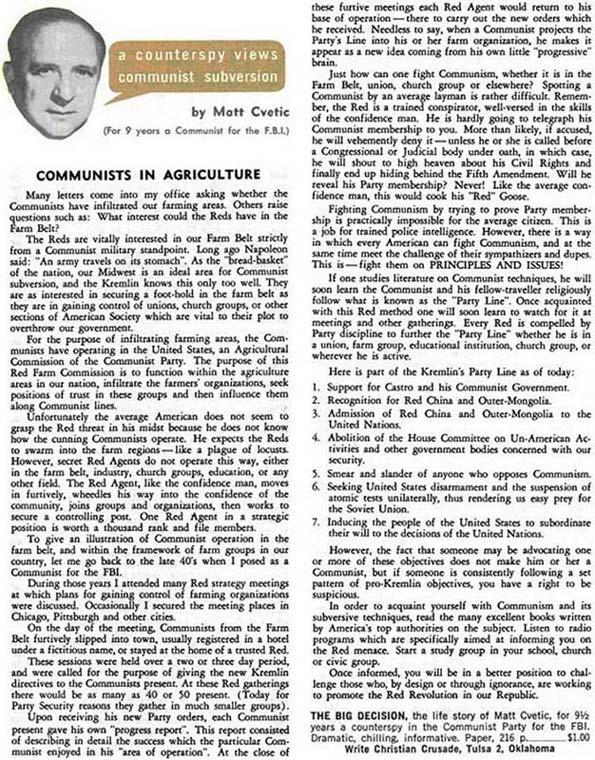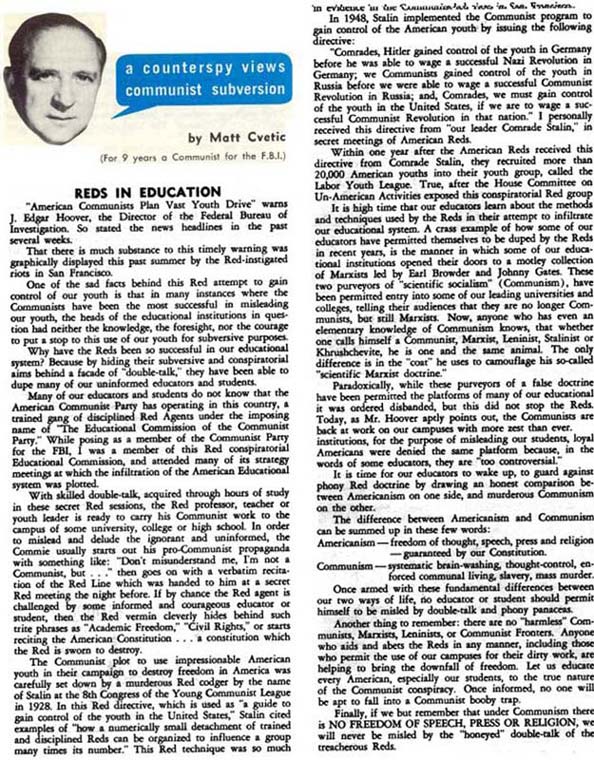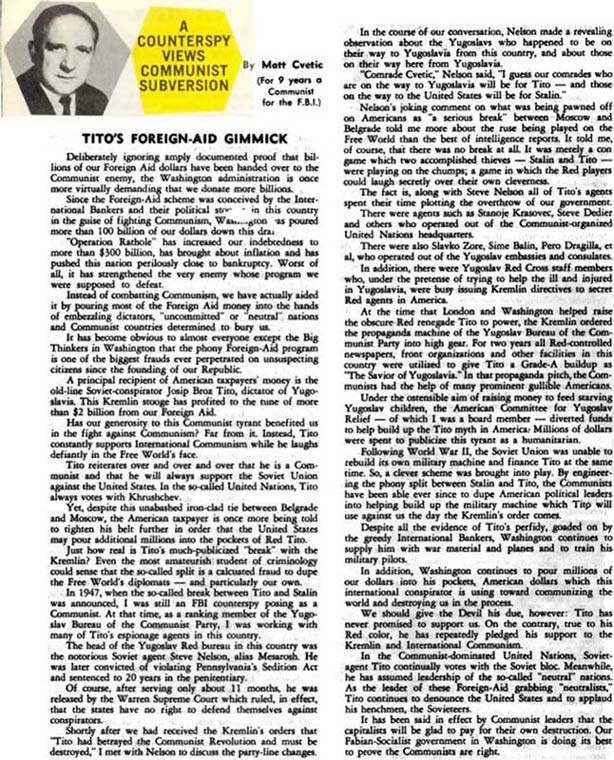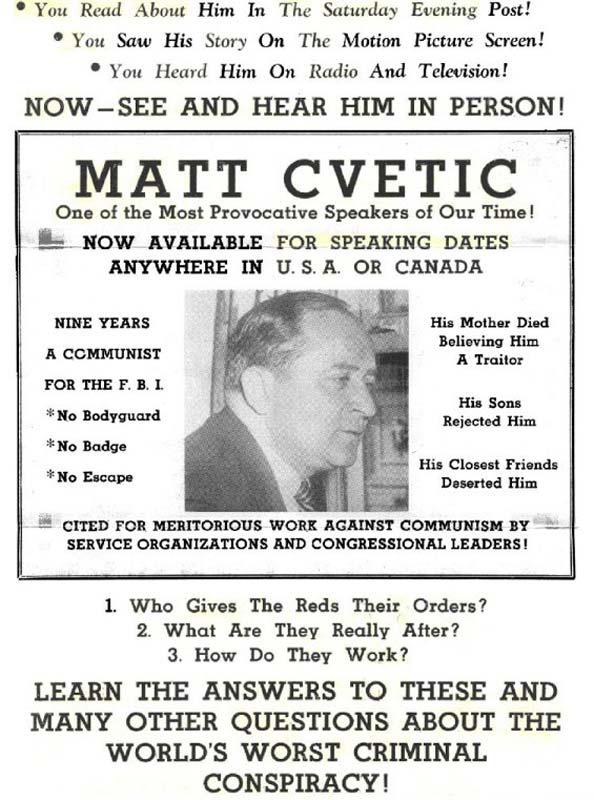
HOMEWesley Britton’s Books,
|
Spies on FilmSpies on Television & RadioSpies in History & LiteratureThe James Bond Files |
|
Spies in History & Literature ~ They Were Communists for
the FBI – The Stories of Matt Cvetic and Herbert Philbrick
By Wesley Britton Editor’s Note ~ The article below was an expanded extract from my then-forthcoming book Beyond Bond: Spies in Film and Fiction (Praeger Publishers, 2005). In this version, I add comments from Matt Cvetic, Jr., which could not be included in the book due to space constraints. In addition, Matt provided me various publications by and about his father attached to this article for those interested in learning more about Matt Cvetic and his times. As I discussed the television series I Led Three Lives in some detail in my Spy Television (Praeger, 2004), I did not go into much discussion here on that series. Copies of I Led Three Lives episodes can be found from various video retailers on the internet. The radio series, I Was a Communist for the FBI, is widely available. The best source is Jon Foulk at Otrcat.com. However, the film version is difficult to find. Neither the Cvetic family nor I were able to find a copy. For a larger image, click on the thumbnails. A new window will open.
One story that pulls together many of the themes of counter-espionage in the 1950s is the life of Matt Cvetic, an informant for the FBI from 1941 to 1950. According to Cvetic, FBI agents approached him in 1941 because of his knowledge of Slavic languages and his job in the U.S. Employment office in Pittsburgh. That position, he wrote, gave him access to files of Communists seeking jobs in local industries, a target of the northeastern American Communist party. He stated the Bureau liked his brief background in criminology and the fact he’d applied for work in U.S. Army Intelligence during World War II but was turned down because he was too short for military standards (Cvetic 1959 5). Later he claimed to have attended close to 3,000 secret meetings and provided the FBI with 50,000 documents, a claim likely close to fact. During his seven years working for the FBI as a low-level official of the Communist Party, his record showed continual praise from his supervisors. Even J. Edgar Hoover himself noted Cvetic’s work was excellent. But after Vedic surfaced in 1950, feeling the time had come for some recognition of his work, the Bureau quickly distanced itself from Cvetic. While local FBI officials favored his request, Hoover refused, saying somewhat disingenuously that going public would be bad policy in all such cases. Despite this disenfranchisement, Cvetic became an important, if tarnished, witness at federal, state, and local deportation and loyalty hearings. On top of this, Cvetic had a quick flash of fame as a celebrity “professional anti-Communist”, inspiring a film and radio series very loosely based on his undercover work. What makes Cvetic’s story of special interest is how he both used and was used by a media looking for heroes and voices against Communism in the same years Sen. Joseph McCarthy took the center stage of American culture. The myth began in 1950 when West Pennsylvania right-wing groups sponsored an interview with Cvetic for a Pittsburgh paper. This story led to a subsequent heavily-scripted radio broadcast of both interviews and dramatized scenes portraying Cvetic as a heroic counterspy whose adventures were more dramatic than any fictional radio drama (Leab 2000 81). The show began, “This special broadcast tonight is being aired in the hope that you, the listening public, will become more aware of the dangers and the workings of the Communist Party.” (Leab 2000 75) Another such program was simulcast on television and radio on July 14, 1950, on Gulf Oil’s popular The People Speak program which again emphasized Cvetic’s heroism and the terror and suspense of his work. Cvetic described himself as an ordinary guy asked by his government to do a job. “A guy who was scared, but a guy who couldn’t say no.” (Leab 2000 86) For the rest of his life, Cvetic parroted these words, repeatedly claiming his double-life led to his divorce from his wife, Mary, and that he sacrificed his family in the name of national service. He said his mother died in 1949 still believing her son had betrayed her adopted country. These claims expanded when The Saturday Evening Post ran a multi-part version of his accounts which lead Warner Brothers to produce a film based on Cvetic’s self-aggrandizing and melodramatic story, I Was a Communist for the FBI. Described by Daniel Leab as a tacky, lurid B-movie in the gangster tradition, the film was intended by the producers to fit the mold established by the widely praised Confessions of a Nazi Spy (1939) and not as a didactic propaganda piece. In a move to recapture moviegoers now finding other entertainments, Hollywood studios were both seeking new genres to sell while retaining old formulas. At the same time, Hollywood couldn’t afford to ignore the urging of politicians like HUAC member Richard Nixon declaring Hollywood had “a positive duty” to make anti-Communist movies. (Leab 1996) So scriptwriter Crane Wilbern and director Gordon Douglas were asked to sell a story with danger and romance. Douglas had earlier directed Walk a Crooked Mile, one of the first anti-Communist films in 1948 in which the FBI and Scotland Yard teamed up to catch a gang of Commie spies. For Douglas, both Walk and I Was were mere jobs for him, not means to address political concerns. Radio actor Frank Lovejoy was given the role of Matt Cvetic and Dorothy Hart was the romantic interest. Ironically, according to Matt Cvetic Jr., the woman she was loosely modeled on wouldn’t approve of the script unless the studio promised not to use the real names of her two twin boys, Matthew Jr. and Richard. As the treatments and screenplay developed, executives noted the film would be “no House on 92nd Street,” the film then regarded as the best documentary-style spy effort to date. Cvetic himself had little to do with shaping the movie. When filming began on January 6, 1951, with less than half the script completed, Cvetic was touring the East Coast doing one-night appearances. Cvetic spoke at women’s luncheons, civic groups, in school gatherings, graduations, and on radio broadcasts (Leab 2000 89-102). But, as even a friendly Pittsburgh reporter declared, Cvetic had “‘a hard time’ staying away from ‘booze and babes’.” (Leab 1996) On one such night, he was jailed for drunk and disorderly behavior, an embarrassment to Warner Brothers. His publicists later claimed they’d created a monster. The FBI agreed. They approached Warner Brothers and warned them about some of Cvetic’s charges, such as the possibility that a Commie operative was in the position to poison the water supply of a California city. Quickly, J. Edgar Hoover sent out a memo to all FBI offices saying the bureau had nothing to do with the film and told agents to be polite but distant from the project (Leab 2000 91). Without question, this movie embellished Cvetic’s story and added a level of evil to the Communist Party, whose membership and activities were far more mundane than Hollywood was interested in portraying. In one section, Cvetic has a sincere interest in a schoolteacher who declares she will name names when she realizes she has been duped. The party orders her liquidation, and Lovejoy’s Cvetic saves her in a shoot-out with CP thugs, a scene not even touched on in Cvetic’s memoirs. In another scene, Red goons use lead-pipes wrapped in Yiddish newspapers to beat and silence union leaders (Leab 2000 99). Like other projects of the era, the party tried to enflame racial tensions for its own ends. Reds boasted they would infiltrate churches, force American women to work in brothels to service Red occupiers of the country, and all Americans would live in harsh labor camps while being brainwashed in the doctrines of Marx, Lenin, and Stalin. While most critics blasted the movie, reviewers tended to get in laudatory words about Cvetic himself, making him something of a noble folk-hero (Leab 2000 100-2). Inexplicably, the movie was nominated for an Oscar as the best full-length documentary of 1951. The subject of the film, however, wasn’t happy. He didn’t make the money he hoped for as all his various managers took large chunks from his earnings. (According to Matt Cvetic, Jr., his father wasn’t doing that badly – “He was driving a big sleek car. We didn’t see any of that money.”) But Cvetic’s fortunes got a second wind when, between 1952 and 1954, popular actor Dana Andrews starred as Cvetic in radio’s version of I Was a Communist for the FBI. Andrews had earlier starred in Behind the Iron Curtain (1948), another effort among the first Hollywood films fusing actual espionage files with early Cold War propaganda. Curtain was a grim, dull film loosely based on the actual case of Igor Gouzenko (Andrews), a young Russian code clerk at the Soviet Embassy in Ottawa, Canada. He’d defected in September 1945 and, in the film, tripped up ten Russian agents (Strada and Troper 1997 85). In his new radio role, Andrews’ voice was heard in a series of 78 episodes enjoying one of the biggest budgets of its day, with scripts by the likes of playwright Robert Lee, later known for such dramas as Inherit the Wind. Producer Frederick W. Ziv found untypical sponsors. The American Legion, Chambers of Commerce, unions and veterans’ organizations considered sponsoring the series as a public service even if the adventures had no basis in fact. In one episode, Cvetic saved the life of a liberal editor who learned he’s been duped by the Party, and in “The Little Red Schoolhouse,” Reds provoke a riot while a female agent tempts Cvetic to test his loyalty. In such scripts, Cvetic said he learned nothing about women. “Why not? Because the women who join the Reds aren’t interested in being women.” One FBI agent monitoring the show described it as “the eeriest kind of cloak and dagger stuff” with poor writing, loose plots, and the endings juvenile (Leab 2000 111). Once again, Hoover insisted there be no connection with the FBI and the series. Again, Cvetic’s public statements while the series was broadcast overreached reality, as in his belief that China was asking the U.S. to intervene on its behalf with Russia and that he personally helped the FBI capture a Nazi spy, a story he retold in his The Big Decision. At the same time, Frederick Ziv promoted another related venture, the syndicated television show, I Led Three Lives, based on the 1952 bestseller built on the actual files of undercover FBI agent, Herbert Philbrick. Like Cvetic, Philbrick had surfaced in 1949 after serving as a middle-level Communist Party official in New York. From 1953 to 1956, and in re-runs well into the 1960s, 117 half-hour adventures were broadcast over 600 stations in an overt attempt into taking anti-Communism into mass culture. One week before its 1953 debut, it was reported it was scheduled on more stations than even network offerings (Grace 2003 22). Unlike Cvetic’s projects, the FBI supported I Led Three Lives and Philbrick had the Bureau look over the scripts. To Cvetic’s distress, Philbrick enjoyed a longer level of fame as he didn’t have the image problems Cvetic brought on himself. Not only did Philbrick gain a reputation with his lectures, but the star of the show, Richard Carlson, also gained an extra income by speaking about his role (Leab 1996). I Led Three Lives ended up being the trend-setting television spy series of the decade. In scripts written by future Star Trek creator Gene Roddenberry, “Those sweet little old ladies who lived in the house on the corner were, it turned out, evil-doing Reds; the elevator operator was a Commie, too; so were the butcher, the baker, and the candlestick maker. If the percentage of Communists to the total population had actually been as high as portrayed on that series, the Communists could have elected the president and held a majority in Congress.” (Grace 2003 22) While American watchers might have missed this breed of overkill, international viewers did not. When the show was aired in Mexico, the Russian embassy filed an official complaint. The series was barred from distribution in Hong Kong, Australia, Argentina, Venezuela, and Columbia. The British House of Commons debated over the implications of the series (Britton 2004 23-4). Later, the series was mentioned in the Warren Commission report when the half-brother to accused Kennedy assassin Lee Harvey Oswald told the commission Lee watched the series faithfully each week, even into reruns (Marrs 1989 98). (Note 1) Through it all, the FBI proudly touted Philbrick as one of their own, and had him host What Is Communism, an early ‘60s short now regarded as a “B movie classic.” (McKee 2003). The script had two points: to praise J. Edgar Hoover and demonstrate the dangers of Communism by, among other techniques, showing viewers footage from Communist work camps that resembled Nazi concentration camp film. According to Marty McKee, Philbrick emphasized and dissected nine key words to understand Commies – “Lying. Dirty. Shrewd. Godless. Murderous. Determined. International Criminal Conspiracy.” Cvetic’s jealousy over the FBI’s treatment of Philbrick was but one reason for a decade full of personal problems. Cvetic checked into rehabilitation centers to deal with his alcoholism, resulting in electric-shock therapy, a condition the Communist press happily capitalized on. In 1954, he tried to run for Congress but lost the primary to a more respected Republican candidate. In a time when first-person memoirs from informants and agents were filling bookshelves, including those of Philbrick, Elizabeth Bently, and Whittaker Chambers, Cvetic talked with various publishers about a book of his own. After a series of rejections, Cvetic issued his The Big Decision himself in 1959. Again, the FBI wanted nothing to do with the manuscript, fearing both claims of censorship as well as claims they had authorized it. While critics felt, largely unfairly, the book was influenced more by the film and radio show than the true story of Cvetic’s undercover work, The Big Decision benefited from Cvetic’s late-life associations with right-wing groups like the John Birch Society and the Christian Crusade, who promoted Cvetic in their publications. In the book, Cvetic made obvious attempts to both show himself in the best light possible while also pointing to his human weaknesses. For example, he remembered the Edgar Allen Poe story, “The Purloined Letter,” which he thought was similar to his renting a hotel room just blocks from Communist headquarters but he was never found out. Going to his first meeting, Cvetic briefly thought of himself as a hard-boiled detective type when he lit a cigarette on a bridge. Unfortunately, the matches exploded in his hand and he went to the meeting in pain. Again, Cvetic was largely a pawn for the interests of others, in this case political fringe groups. Cvetic wrote articles for The American Mercury and Christian Crusade where he accused comedian and Tonight Show host Steve Allen, former First Lady Eleanor Roosevelt, and Dr. Linus Pauling of Communism. All this occurred long after the heyday of McCarthyism and Cvetic was unable to stir up the fervor of old. Still, in October 1961, one of his articles, “Communism in Agriculture,” was read by a John Birch member who happened to be a Congressman into the Congressional Record. 


Matt Cvetic’s articles – “Communists in Agriculture”, “Reds in Education”, and “Tito’s Foreign Aid Gimmick”. Before his death in 1962, many of Matt Cvetic’s earlier claims about himself and his official testimony also became matters of debate. His theme of self-sacrificing patriotism was challenged when critics noted Cvetic was guilty of avoiding child support, spousal abuse, and beating his sister-in-law (Leab 2000 18). (According to Matt Jr., the claim of attacking his aunt wasn’t all that dramatic. “I think Dad pushed her when she asked for money she’d loaned him.”) While his sons still believe his motives were patriotic, Matt Jr. remembers his mother’s complete disbelief her husband worked for the government and said he turned in Reds to save his own skin. She refused to call Matt Jr. by his given name. “She called me Murray,” he said. He remembers the family discord seemed more a matter of his father being away most evenings to go to meetings and remembers his mother’s anger for all the Daily Workers lying around.
According to Daniel Leib, no Cvetic supporter, Cvetic liked intrigue, began his work as a patriot with a minimal stipend, but as time progressed, Cvetic pressed the FBI for larger sums of money (Leab 1996). It seems the Bureau valued what he provided and continued to give him raises as the years went by. Technically, of course, Cvetic was not a trained FBI agent but more accurately a “confidential informant,” a term not always clear in subsequent reports on his activities. The fact he lacked any experience or education in his work and that he was largely left to his own devices during his years as a double-agent should earn him a level of respect and sympathy for his burdens. Still, while not publicly known until 1991, the FBI fired Cvetic before he rose to fame apparently because of his alcoholism and his indiscretions revealing his work to clergy, family, and friends (Leab 2000 2). While there seems little question Cvetic was a valuable plant in Pennsylvania Communist operations, his use in subsequent trials and hearings is less praiseworthy. Even as his name came to national prominence in the media, his testimony was often questionable and led, like many other such hearings, to innocent victims being brushed with labels they didn’t deserve. Matt Jr. recalled seeing people coming by the Cvetic home begging not to be added to the lists given to authorities, although most records indicate the provided names were already well known to investigators. (Note 2) All these aspects of Matt Cvetic’s career point to key characteristics of the 1950s beyond adding a sad twist to the old motif of the “patriotic spy.” (The series of FBI informants also serve as real-life examples of “amateur spies” in a grimmer realm than the fiction of John Buchan and his breed.) First, America's fears of a Communist takeover were fanned by the likes of Cvetic and Philbrick, who were first spies, then public informants in Congressional hearings, and finally media-driven spokespersons during the Red Scare. Whatever value their undercover work and testimony afterward, they became central figures in the media who took their spycraft and re-wrote history for clearly commercial purposes. As books, films, television series, and radio shows beat the drums against the Red Menace, figures like Cvetic and Philbrick gave credibility to the myths that grew around them as they made public appearances in every venue possible. They put a face to the abstractions of the fears of atomic war. Addendum ~ June, 2006 ~ With deep sadness, I here report that on Friday, May 26, 2006, Matt Cvetic Jr. died. There are very few details known at this point. I met Matt through a friend of mine who’d had music lessons from Matt when he taught at a blind school back in the ‘60s. Researching the information used in the article above, I came to know Matt’s deep interest in his family history, the work of his father, and Matt Jr.’s lifelong devotion to his first love, music. I lost track of how many churches Matt played organ for or how many choral societies he was involved in. He might have been in his 80s, but he spent few hours sitting at home. I treasured the information Matt mailed to me about his father and the family memories he shared with me by phone. My favorite memory of Matt is when I sent him a book about his father he had never seen and he called me to say he saw a photo of himself as a boy on the front cover. He will be missed. Notes ~ Note 1 – An interesting Lee Harvey Oswald/Herbert Philbrick connection was discussed in a “Daily Rant” for a July 2003 online Behind the Barricades. According to Kenneth Kahn, Oswald may have been a double agent for the U.S. government infiltrating pro-Castro Communists groups. Kahn listed the various possibilities supporting conspiracy advocates who think this had something to do with the Kennedy assassination. On the other hand, Kahn noted Herbert Philbrick had other ideas which he included in a 1974 edition of I Led Three Lives. Philbrick felt the Paine family hadn’t done their American duty by not reporting Oswald to the FBI when he made his support of Communism clear in Dallas. Note 2 – At some point, a fuller understanding of the relationship between Matt Cvetic and his sons will be made public if Matt Cvetic Jr. shares the letters he’s kept from his father. Judging from the extracts Matt Jr. read to me, the senior Cvetic was full of useful advice and affection for his namesake – even warning him to be wary of people who could exploit him for their own ends. Something, Matt Sr. wrote, he’d learned the hard way. Sources ~ Britton, Wesley. Spy Television. Westport, CT: Praeger Pub. 2004. Cvetic, Matt. The Big Decision. Self-published by author. 1959. Grace, Roger M. “Channel 11 Loads Its Schedule with Syndicated Shows.” Metropolitan News-Enterprise. 22 Jan 2003: 22. Kahn, Kenneth R. “Will the Real Ruth and Michael Paine Please Stand Up?” Behind the Barricades. Daily Rant for July 25, 2003. 6 Jun 2004. Leab, Daniel G. I Was a Communist for the FBI: The Unhappy Life of Matt Cvetic. University Park: Pennsylvania Univ. Press. 2000. Leab, Dan. “I Was a Communist for the FBI.” History Today. 1 Dec 1996: 42-47. Marrs, Ken. Crossfire: The Plot to Kill Kennedy. New York: Carroll and Graf. 1989. McKee, Marty. “Adventures in B-Festing.” 26 Jan 2003. 3 April 2004. Strada, Michael and Harold Troper. Friend or Foe: Russians in American Film and Foreign Policy (1933-1991). Lanham, MD: Scarecrow Press. 1997. |
